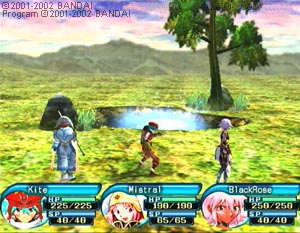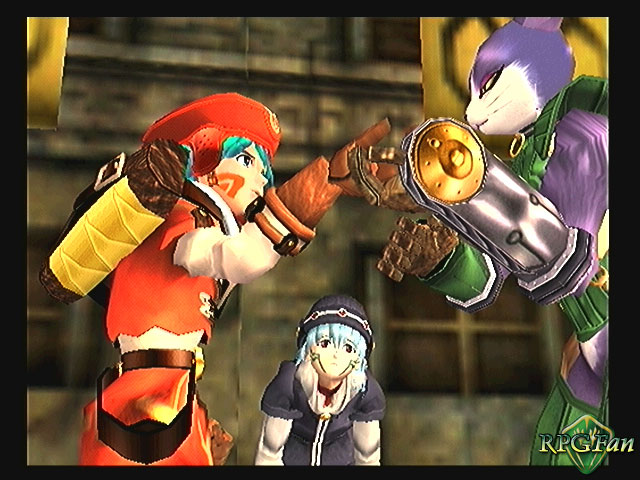Daisuke Uchiyama entered Bandai in 1994 and since then has worked on Dragonball Z, Dragonball Final Bout, and First of the North Star. As producer of the .hack series, he has been coordinating the work of a team including character designer Yoshiyuki Sadamoto (of Neon Genesis Evangelion fame), scenario writer Kazunori Itou (Ghost in the Shell) and animation director Kouichi Mashimo (Popolocrois Monogatari).
In the following interview, Mr. Uchiyama is mainly talking about the series third installment, .hack//OUTBREAK, which was released in Japan on December 12th last year. With the recent release of the series’ final episode, .hack//QUARANTINE (Vol.4), the series has been concluded, at least in Japan.

Q: We had the pleasure to play the .hack series. It’s not only a game, but in diverse ways an anime, OVA (original video anime and game bundle), manga and novel all packed into one fantasy game named The World. This is a pretty interesting and deep development.
A: Thank you. Since this is a pretty large-scale project, the world keeps growing every day. I think it’s good when you can have fun and see the various parts that aren’t represented, seeing they’re neither like this or like that.
Q: The series is being released in a total of four volumes, but originally, how exactly did it start?
A: The reason for that is because at Bandai, there are a lot of character [licensed] games. In the middle of this, we wanted to try and create an original RPG title. What we got the most support for was the fact we were challenging the RPG genre, and that’s how we started.
Q: Well, for Bandai that was a new form of challenge, wasn’t it?
A: Put simply, when an original title pops up, no matter how good a product it is, it won’t be easily accepted. Deciding how to tackle this was quite a problem. Can we convey the charm of the product? From that point, we first decided to develop into various directions we hadn’t even imagined. Because the project was started three years ago, it was also before the PlayStation 2 went on sale. The beginning was when we decided to first try to make the game on the PlayStation 2.
Q: Indeed, so the decision to develop for PlayStation 2 was prior?
A: First of all, scenario writer Kazunori Itou did us the favor of participating [in the project]. Together we spent quite some time going over the plan. And then when we brought the project to the supervisor of our [company’s] video game division, we ended up suggesting to include a DVD with the game. Because obviously you can view video DVDs with the PlayStation 2 itself, we said, “hey, why not!” Since there is an interactive story depicted in the world, when you are playing, and there is also a story depicted in anime form through the OVA, we thought it would make it a complex world. With this additional impact, the project became more solid.

Q: The fact that the story is set in a network game is an interesting concept.
A: This is “a mock network game.” There is no size to the threshold of a network game and we are toying with the style of network games. Also, you can view the events outside in the anime. This has become the concept.
Q: Currently, network games are being bombarded with attention, be in a good or bad way. Did you think about making [the game] about this subject 3 years ago?
A: Even three years ago, there were network games and it was a time when IT was being used, so it wasn’t that difficult to set up this plan. At any rate, we thought network games would become a burning issue. With .hack, we are creating a good mix of a network game and a standard game. Among today’s network games, there are many games of the type where you have a world which the users enter, and then they are asked to make their own story. However, if there is a story in such network games, don’t they become more interesting? For .hack, a magnificient story written by Kazunori Itou is being prepared. Because the flow of the story is added to the network game atmosphere, it’s easier to play.
Q: .hack is set in the year 2007, right? How will the world look like at that time?
A: It’s the near future, but it’s not SF. It’s this kind of time setting. It’s stage is a real world from step ahead from now. A scenery of the current world in the year 2010 probably won’t be much different (from now). In this world slightly ahead of us, this kind of events may occur, this is the kind of story it is.
Q: So it’s neither fantasy nor science fiction. It’s set in the real world just one step ahead of us.
A: Actually, I hate fantasy. I’m sick of it, I feel like “geez, enough swords and magic.” So I didn’t want to make .hack a standard RPG. For instance, while you are playing a standard RPG, it’s “you are the prince, save the princess and slay the dragon” and eventually you have to act yourself. I think that’s tiresome and itchy. In the case of .hack, we made the acting itself into the game. For instance, you can understand if a character you got acquainted with in the game is really a school grader or a Jr. High Schooler. You can sometimes find out a female character is actually played by a man. Because somehow we wanted to prepare a comeback saying “isn’t this a game after all.”

Q: When you start the game, all of the sudden a desktop is being displayed on the screen, but from this point onwards, reality and the boundary line of the game’s world are merging into each other.
A: Indeed. When you press the log-in button and the game starts, no matter what happens it’s “yeah, but this is a game.” In the game, cute and cool characters appear, but everyone plunges into it saying “are you okay this way?” In standard RPGs, it would mean a failure for that character’s creation, but here it is also part of the world.
Q: In .hack, there are men pretending to be women as well as liars. This is the kind of game it is. For instance lately there are CG movies [in games] but if you look at them you’ll notice no matter what, they’re CG. This is close to this feeling.
A: There are also stories about players talking together and someone interfering telling the bragging one: “You are a pain.” This probably hasn’t appeared in such RPGs.
Q: In the game you have also prepared a mock-BBS. There are various posts, on good things as well as bad things.
A: There has to be this kind of message board. The badmouthing is naturally a vivid part of it, but there’s probably no message board where you can’t exchange such words. I think simply if it was just a message board to look for information, it would have been a typical page with hard to find information. [In the .hack BBS], there’s one more face of the characters depicted, it’s another field of .hack.
Translated by Chris Winkler and Eve C.
Creator’s Talk 2003 Interview Series
- Akitoshi Kawazu, Square Enix – UNLIMITED:SaGa
- Akihiro Hino, Level 5 – Dark Chronicle (Dark Cloud 2)
- Makoto Ikehara and Tatsuya Yoshikawa, Capcom – Breath of Fire V – Dragon Quarter
- Daisuke Uchiyama, Bandai – .hack Volume 2
- Akira Yoshizumi, Namco – Tales of Destiny 2

